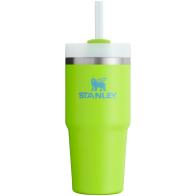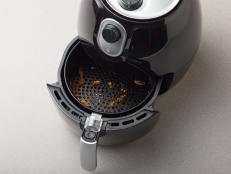Can Clean Wine and Purifiers Prevent Wine Headaches?
Experts explain the science behind wine headaches, and why there's no substitute for drinking responsibly.

Thomas Barwick/Getty Images
Sales of alcohol skyrocketed by more than 80% in 2020, according to a recent report. Along with this booze boom are even more advertisements for "clean" alcohol brands — especially clean wine. Claims of wine made with fewer preservatives, less sugar and even the promise of less side effects are taking over social media feeds, and even celebrities are getting involved. We tapped into expert sources to help uncork what clean wine means and find out how to make drinking less of a headache.
Why Does Wine Give You a Headache?
Anyone that’s had one too many cocktails can tell you that excessive alcohol consumption can leave you with a headache. However, there’s also a long standing belief that even a few sips of wine can spark a headache. Rumors flow, blaming various components of wine: Are you sensitive to the sulfites? Do the tannins bug you? Are you sipping on too much tyramine? Some of it has to do with the amounts of certain compounds found in wine, which varies by vineyard and varietal, but there's more to it than that.
A Breakdown of Wine Components
First, it's important to understand what the various components of wine actually are, because they may be the key to finding if wine can in fact cause those “wine headaches.” Here's a mini glossary:
- Sulfites – Naturally occurring substances in wine that are created as part of the fermentation process. Additional sulfites are often added to wine prevent oxidation and maintain freshness. Sulfites are also naturally existing in eggs, teas and other fermented foods, plus sulfites are added to other foods (like baked goods) to help maintain freshness. About 1 in 100 people are sensitive to sulfites in some way.
- Tannins – Naturally-existing compounds in plants with extremely astringent properties, contributing to bitterness and the dry mouth feeling present in bold wines (such as cabernet). Tannins are heavily present in all parts of the grape plant (seeds, skins and stems), therefore red wines (which are typically fermented with these parts) tend to have more tannins than white wines. While rare, some people are sensitive to tannins.
- Tyramine – Another natural food-based phenomenon, this compound is created from the breakdown of a specific amino acid and is also often found in aged or fermented foods like cheese and wine. High amounts of tyramine in the blood can affect blood pressure.
- Histamine – Yet another compound created through the fermentation process, histamine is also produced by the body’s immune system. A specific enzyme is needed to process histamine and those with lower levels of this enzyme may experience adverse effects.
Dr. Taylor Wallace, principal and CEO, Think Healthy Group and chief food and nutrition scientist, Produce for Better Health Foundation points out that while some folks are sensitive to sulfites, those in wine may not be so bothersome. “While sulfites can trigger reactions, it is typically not headaches. As for the often-cited ‘wine headache,’ there is really not much science supporting the link with sulfites. Wine contains about 10 times fewer sulfites than, for example, dried fruits and several other foods… which never seem to be a problem for most consumers.”
On the other hand, those tannins do cause reactions in some people and headaches are a possibility. “If you are sensitive to tannins then avoiding red wine and tea should solve your issue,” suggests Wallace. Tyramine may also be to blame. “It can affect blood pressure and has also been suggested to cause headaches,” says Wallace. If you also get a headache after eating aged cheeses, smoked fish or cured meat independently of wine, this may also be a sign you have a tyramine sensitivity.
Do you have a headache yet? This clearly isn’t a simple issue. Deena Kuruvilla, MD, neurologist, headache specialist and director of the Westport Headache Institute says, “It’s not just one thing that triggers headaches.” When you combine some wine with other things like stress, dehydration and lack of sleep you are asking to bring on that headache. The combination of two or three (or more) factors is likely what is making your head pound. “So it’s most likely not the wine itself, but the combination of multiple triggers,” adds Kuruvilla.
Dr. Kuruvilla also points out alcohol plays “a huge role in headaches.” There is ample data to support that alcohol also spikes feel good neurotransmitters serotonin and dopamine, but when these levels drop, headaches can occur. “Overconsuming alcohol leads to dehydration,” adds Wallace, "which can often cause headaches due to the vasoconstriction of blood vessels.”
What Is Clean Wine?
As a result of concerns around certain compounds in wine causing headaches, some consumers turn to clean wine as a solution. The industry has exploded with vineyards and wine clubs like Scout + Cellars and Dry Farm Wines offering cases of squeaky clean wine at your doorstep. But what exactly is clean wine? Company websites explain these wines are made with little or no added sugars, lower sulfite levels and in some cases, lower percent alcohol by volume.
Celebs are also getting in the action. Cameron Diaz is a backer of Avaline. “We always use organically grown grapes and never add colors, concentrates, or unnecessary sugars and sulfites,” professes Jessica Blumenthal, vice president of brand and innovation at Avaline. “Any ingredient we do use are NOP (National Organic Program) approved and we never use animal by-products.”
There is no official definition clean wine. Many brands claim their wines are "clean" because they contain organic ingredients, no sugar and fewer sulfites, but while wines can be labeled organic by meeting a series of regulated requirements, there are no official regulations or certifications in place to help consumers differentiate a "clean" label from other bottles on the shelf.
And as for potentially headache-inducing compounds and alcohol, these can all exist in clean wines, too. So if any of these compounds is the root cause of your "wine headache," sipping a clean wine likely isn't the solution.
Can You Clean or Purify Your Wine?
Clean wine isn’t the only industry aiming to help with wine woes. Products aimed at helping you lower tannin and sulfite levels in wine, as well as rehydrate after a couple of glasses, are making their way onto the market. And while neither of these products are FDA approved treatments, they offer some interesting options for wine lovers.
Tiny drops of Drop It in your wine aims to lower the tannin and sulfite content one glass at a time. Created by a lifelong wine headache sufferer, the mixture of hydrogen peroxide and egg white powder claims to reduce these compounds in both red and white wines by changing the chemical composition. This process can produce some sediment in your glass and whether it impacts the flavor and mouthfeel of the wine may vary by the varietal.
If you're not interested in altering what's in your wine glass, you may want to test drive some Hydromom, a drink mix made from coconut water, electrolytes and glucose to help up your fluid intake and and as they say “help reduce those nasty hangover headaches.”
Bottom Line:
When it comes to headaches from alcoholic beverages, including wine, there is no replacement for drinking responsibly. Experts agree there is no one factor to blame for those wine headaches, but staying hydrated is never a bad idea.
Dana Angelo White, MS, RD, ATC, is a registered dietitian, certified athletic trainer and owner of Dana White Nutrition, Inc., which specializes in culinary and sports nutrition. She is the author of four cookbooks First Bites: Superfoods for Babies and Toddlers, The Healthy Air Fryer Cookbook, The Healthy Instant Pot Cookbook and Healthy Quick and Easy Smoothies.
*This article was written and/or reviewed by an independent registered dietitian nutritionist.
Related Links:































